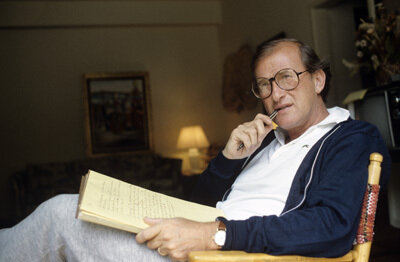Larry Gelbart: Weapons of Mass Distinction
Larry Gelbart tells a rapt crowd at the University of Judaism’s Gindi Auditorium that Isaac Bashevis Singer once had a man introduce himself at a lecture by saying, “I’m a young, struggling writer...”
“Stop struggling and write,” interrupted Singer.
For Gelbart, who has mastered the comedic and dramatic in radio, TV, films, theatre and his memoir, Laughing Matters, the anecdote is particularly apropos. One of our finest scribes had no formal education beyond L.A.’s Fairfax High School, and began writing for the radio show Duffy’s Tavern at the tender age of seventeen.
With Tony and Emmy and WGA and film critic awards, and Oscar nominations for Tootsie and Oh, God!, it is reasonable to wonder which medium gives the eclectic wordsmith the greatest satisfaction and his answer is unhesitatingly the theatre. But it isn’t just the successes of A Funny Thing Happened on the Way to the Forum, Mastergate, City of Angels and others. “You get fewer notes. The audience gives you the notes.”
Indeed, Gelbart identified City of Angels as “one from the spleen,” his book for the musical reflecting the compromises and authorial battles even the finest of writers often encounter in TV and film. It has everything to do with Gelbart’s describing John Belushi and Dan Ackroyd’s bastardization of his screenplay for Neighbors as “having a party and having the Borgias as your bartenders.”
Mastergate, the Broadway play, seen later on Showtime, which in its word play so brilliantly lampooned the Iran-Contra hearings, posited that a war in a Central American country was secretly authorized by Washington under the guise of shooting a war film in that country. Mastergate suffered no greater creative differences than a theatre box office getting a call from a woman, who, upon mishearing the title of the show, spat out, “I don’t have to take that kind of talk from anybody!”
Gelbart’s incomparable, savage wit first took wing in the first four seasons of his TV series M*A*S*H. An excerpt of the final show at Gindi, which he wrote, directed and utilized improvisational techniques, displayed both the humor and indignation which has been the trademark of his HBO movies, like Weapons of Mass Distraction, Barbarians at the Gate and the recent And Now Pancho Villa Starring as Himself. He notes that there is a continuum to political consciousness. “It’s easy to be anti-war. People in the military are anti-war. It (M*A*S*H) was anti the people who get us into war.”
One of the hardest working grandfathers in show biz, Gelbart, “a recovering clarinetist,” has the musical Like Jazz, which features his writing, opening this week at the Mark Taper Forum. The revival of his Sly Fox, an adaptation of Ben Jonson’s Volpone, is scheduled for April 1 on Broadway and the remake of the film The Candidate, which he scripted for Robert Redford, will be running for box office soon.
With a Milky Way of experience, it is not surprising that the former writer for Bob Hope and Sid Caesar is less than impressed with the modern day offerings on television. He is asked, almost plaintively, if anything makes him laugh on TV. A warm smile spreads across his face and with a deceptively effortless grace for humorous political dissection, he says, “C-SPAN.”
(Originally published in Entertainment Today)
